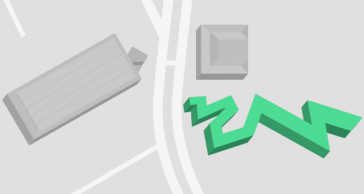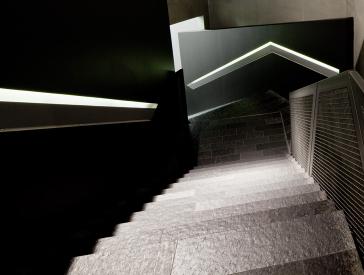
Video still from the exhibition Roundhouse Reverb; Robson/Vincenz
Roundhouse Reverb
A Film Installation by Isabel Robson and Susanne Vincenz, Set to Kafka Fragments, Opus 24 by György Kurtág
This installation depicted two women traveling east from Berlin, with a violin and the score of Kafka Fragments by the Hungarian composer György Kurtág in their luggage. In an abandoned roundhouse along the railway line, they discover a resonant space for Kurtág’s music.
Past exhibition

Where
Libeskind Building, ground level, Eric F. Ross Gallery
Lindenstraße 9–14, 10969 Berlin
The footage follows the singer Caroline Melzer and the violinist Nurit Stark along their subsequent stops in Poland and Russia. However, the East through which the women travel begins to transcend specific locations and drifts into the imaginary. The two musicians become figures that sometimes seem to come from the post-Soviet daily grind, other times from the world of Franz Kafka.

Video still from the exhibition Roundhouse Reverb; Robson/Vincenz
Kafka Fragments, op. 24, composed in 1987, ranks among the most significant works of contemporary chamber music. Kurtág used aphorisms and isolated phrases by Franz Kafka that touch on the motif of travel and the road. The composer dreamed that his work would be performed beyond the concert hall: in schools, universities, or clubs. The fragments were conceived to resemble fliers blowing in the wind at passersby.
Kurtág’s cycle was featured in a film installation at the museum that explores the absurd potential of Kafka’s text fragments paired with music clips. The circular arrangement of screens, just like the roundhouse, became a wheel through time.
A production by Roundhouse Reverb GbR in cooperation with the Jewish Museum Berlin, deSingel International Arts Campus Antwerp, and Deutschlandradio Kultur. Funded by the Hauptstadtkulturfonds.
Exhibition Information at a Glance
- When 15 Mar to 26 Apr 2013
- Where Libeskind Building, lower level, Rafael Roth Learning Center
Lindenstraße 9-14, 10969 Berlin
See Location on Map


